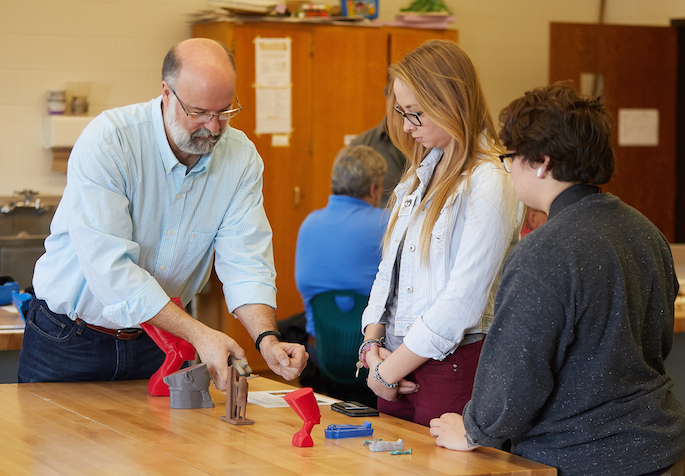Posted 11:19 a.m. Monday, March 26, 2018
UWL Egyptologist partners to preserve Middle Eastern materials at a time of conflict, threats to cultural heritage.
UWL Egyptologist partners to preserve Middle Eastern materials at a time of conflict, threats to cultural heritage
UWL Associate Professor and Egyptologist David Anderson is one of the first contributors to an international effort to preserve Middle Eastern cultural heritage collections in one publically-accessible digital library. Anderson, who has mastered transforming 2D pictures of archaeological artifacts into 3D computer images, helped successfully test bringing 3D records into this digital collection — the Digital Library of the Middle East. Anderson also collaborated on the technical and content development of the platform. The DLME, currently a prototype, creates one digital open-source platform to share and preserve Middle Eastern culture at a time when the region faces displacement of people, loss of life in conflict zones, and ongoing threats to its cultural heritage through destruction, looting and illicit trafficking, according to the DLME website. The DLME will ultimately include text, video, photographs, archives, manuscripts, 3D data, and maps of Middle Eastern history over 12 millennia. These items are curated by scholars, specialists, and members of the living and vital cultures it represents. So far the DLME holds 135,000 representative records from a variety of collections. In addition to Anderson’s contributions, other collections come from the Penn Museum, the American Numismatic Society, the Metropolitan Museum of Art, the Center for Geographic Analysis - Harvard University, the Stanford Libraries, and the University of Pennsylvania Libraries. Other contributors include: the Antiquities Coalition, the Johns Hopkins University Libraries, the Princeton University Libraries, the Qatar National Library, and the Yale University Libraries. The platform was developed by an engineering team from the Council on Library and Information Resources and the Stanford Libraries. Additional partners include: Antiquities Coalition, Qatar National Library, and in service to and collaboration with institutional and individual collaborators throughout the Middle East and Northern Africa (MENA) region. It was created with funding from the Whiting Foundation. "Through close collaborations with the stewards of the cultural heritage of the Middle East, the DLME aspires to bring the full richness of that long history to students, teachers, scholars, and citizens throughout the region and around the world,” said Daniel Reid, executive director of the Whiting Foundation. “This proof-of-concept has been a crucial first step in building the technical infrastructure and beginning to establish the many partnerships necessary to achieve this important ambition." [caption id="attachment_51493" align="alignnone" width="685"] Associate Professor David Anderson, Archaeology and Anthropology, shows 3D printed models of artifacts to students at UWL’s Creative Imperatives in February. He has also put his 3D photography skills to use as part of an international project to preserve Middle Eastern cultural heritage. He provided a 3D record of a statue of Sekhmet to the Digital Library of the Middle East that led to a successful test of bringing 3D records into the prototype.[/caption]
Read more on Anderson’s incorporation of 3D archaeology into research and teaching.
Associate Professor David Anderson, Archaeology and Anthropology, shows 3D printed models of artifacts to students at UWL’s Creative Imperatives in February. He has also put his 3D photography skills to use as part of an international project to preserve Middle Eastern cultural heritage. He provided a 3D record of a statue of Sekhmet to the Digital Library of the Middle East that led to a successful test of bringing 3D records into the prototype.[/caption]
Read more on Anderson’s incorporation of 3D archaeology into research and teaching.
